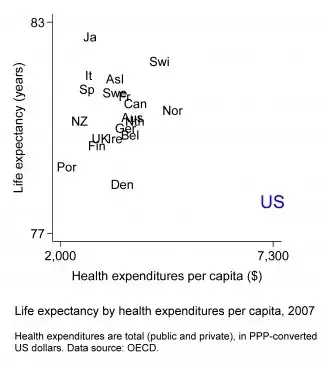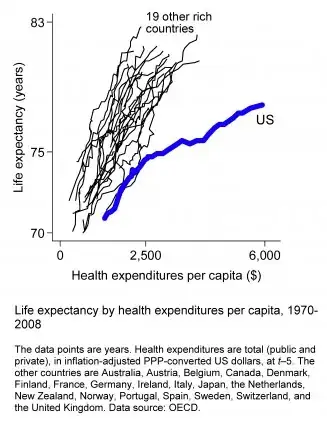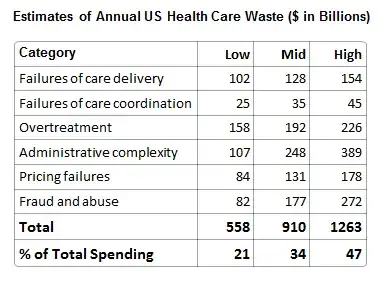We can be sure there is waste in the US system by looking at the variation among US regions in spend and outcomes
Short Summary:
There is plenty of internal evidence that the US healthcare system overtreats patients to the point of harming them and doesn't inform them well enough to make informed tradeoffs about their care. In short, it spends a lot on activity that doesn't benefit the patient, in other words too much activity is waste.
Comparisons of different countries healthcare systems suggest that the USA has a lot of waste. But there are a lot of confounding factors that complicate such comparisons (as the other answers here discuss). But there are analyses of the regional variations present in the US healthcare system that come to similar conclusions and that don't suffer from the problems of international comparisons. This answer summaries some of those studies and concludes that internal evidence shows that there is significant waste in the US system.
It is worth being clear what we mean by waste. A useful definition is spending that doesn't benefit the patient, though we have to be careful what we mean by this. Some commentators and politicians any spending not on "front line staff" (i.e. on administration and management) is waste because it doesn't directly benefit the patient. This isn't the definition of waste required here not least because any effective healthcare system needs some level of management to be coordinated and well organised. There is even evidence linking lower death rates with the quality of management in hospitals (see the pdf available on the London School of Economics site; NB this is a download link).
This definition of waste recognises that not all medical activity is useful and points to the sort of evidence that might help decide whether a particular type of activity is good for the patient. The american public sometimes seems to believe that more medical activity is always good (see the skeptics questions here Does screening for prostate cancer save lives? and here Is routine screening for breast cancer for asymptomatic women worthwhile?). This definition also avoids the issue of value for money. The issue isn't whether it is worth spending a large amount to get a small benefit, but whether there is any benefit at all from doing more medical activity.
The reason why analysis of the variations in activity levels in the USA are useful is because they allow a good statistical comparison of both activity rates, outcomes and patient perception. The most thorough analysis is the result of the ongoing work of the Dartmouth Atlas Project (website here). And a major conclusion of their work is that a disturbingly large proportion of healthcare activity in the USA is waste by the definition above.
The bottom line of much of the Dartmouth work is summarised here (my emphasis):
...studies comparing similar patients have found that those in higher-spending regions are more likely to be admitted to the hospital, spend more time in the hospital, receive more discretionary tests, see more medical specialists, and have many more different physicians involved in their care. The extra care does not produce better outcomes overall or result in better quality of care, whether one looks at measures of technical quality (such as providing appropriate medication to heart attack patients), or survival following such serious conditions as a heart attack or hip fracture. Higher spending also does not result in improved patient perceptions of the accessibility or quality of medical care.
So by the definition of waste given above, this suggests there is a lot of waste. One estimate of how much was given by Wennberg (one of the founders of the Dartmouth Project) in a BMJ article in 2011:
If the whole of the US followed the practice patterns of high quality, low cost regions served by organised systems such as Mayo Clinic and Intermountain Healthcare, Dartmouth atlas benchmarks suggest it would save 40% of resources spent on chronic illness.
Wennberg's book, Tracking Medicine, is a good source for the background, history and conclusions of the project.
These figures are easier to understand in the light of their causes. Two in particular seem to be major factors driving variation in the US system: preference sensitive care and supply sensitive care.
Preference sensitive care occurs when the different patients may choose different trade-offs when weighing up treatment options. But the Dartmouth analysis reveals large degrees of variation that depend on medical practice not patient choices. As they summarise (my emphasis):
Even when evidence exists as to outcomes, surgery rates can vary dramatically from place to place. This is the case in early stage breast cancer. Studies show that mastectomy and lumpectomy achieve similar long-term survival, but women generally differ sharply in their attitudes toward these treatments. Yet in an early Dartmouth Atlas study, we found regions in which virtually no Medicare women underwent lumpectomy, while in another, nearly half did. We see dramatic variations in rates of surgical treatment for other conditions where multiple treatment options are possible, such as chronic angina (coronary bypass or angioplasty), low back pain (disc surgery or spinal fusion), arthritis of the knee or hip (joint replacement), and early stage cancer of the prostate (prostatectomy). Such extreme variation arises because patients commonly delegate decision-making to physicians, under the assumption that doctors can accurately understand patients’ values and recommend the correct treatment for them. Yet studies show that when patients are fully informed about their options, they often choose very differently from their physicians.
We know that adequately informed patients often choose lower rates of intervention. As the conclusion of this study reports:
Decision aids have a variable effect on decisions. They reduce the use of discretionary surgery without apparent adverse effects on health outcomes or satisfaction.
Supply sensitive care occurs when the capacity of system seems to drive the level of activity in it. This sounds like a good thing to those who assume more medicine is always good, but if the extra activity doesn't result in better results for patients, it is waste. This, again, is what the Dartmouth studies find:
Simply put, in regions where there are more hospital beds per capita, patients will be more likely to be admitted to the hospital. In regions where there are more intensive care unit beds, more patients will be cared for in the ICU. More specialists will result in more visits to specialists. And the more CT scanners are available, the more CT scans patients will receive. The Dartmouth Atlas has consistently demonstrated these relationships.
In regions where there are relatively fewer medical resources, patients get less care; however, there is no evidence that these patients are worse off than their counterparts in high-resourced, high-spending regions. Patients do not experience improved survival or better quality of life if they live in regions with more care. In fact, the care they receive appears to be worse. They report being less satisfied with their care than patients in regions that spend less, and having more trouble getting in to see their physicians. Most studies have found that mortality is no better in higher in high-spending regions, almost certainly because the benefits to some patients are counterbalanced by the harms to others. Hospitals can be dangerous places, where patients face the risk of medical error, adverse events, and hospital-acquired antibiotic-resistant infections. As more physicians get involved in a patient’s care, it becomes less and less clear who is responsible, and miscommunication and mistakes become more likely. Greater use of diagnostic tests increases the risk of finding -- and being treated for -- abnormalities that are unlikely to have caused the patient any problem. Patients who receive care for conditions that would have never caused a problem can only experience the risk of the intervention.
I'd also recommend dipping into two other books for more detailed discussion of the evidence: Testing Treatments and Better Doctors, Better Patients, Better Decisions. The first chapter of the second book starts by quoting two extraordinary examples where the US health system overuses screening in expensive and damaging ways:
Almost ten million U.S. women have had unnecessary Pap smears to screen for cervical cancer--unnecessary because, having already undergone complete hysterectomies, these women no longer have a cervix. Original JAMA paper here
Every year, one million U.S. children have unnecessary CT scans. An unnecessary CT scan equates to more than a waste of money: an estimated 29,000 cancers result from the approximately 70 million CT scans performed annually in the United States. NEJM reference here
(Note: I quoted these examples in an to the question answer here: Are the vast majority of medical procedures routinely used by physicians ineffective and unproven? but they are even more relevant to this question).
In summary: there is plenty of internal evidence that the US healthcare system overtreats patients to the point of harming them and doesn't inform them well enough to make informed tradeoffs about their care. In short, it spends a lot on activity that doesn't benefit the patient, in other words too much activity is waste.
NB This should no be considered an attack on the US system. Other systems also show this sort of variation and waste. See for example the NHS Atlas of Variation for a similar analysis in the (supposedly) more centrally controlled English NHS.



